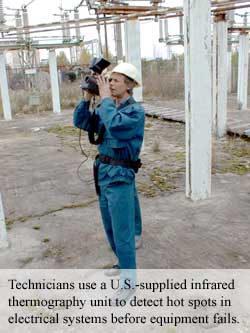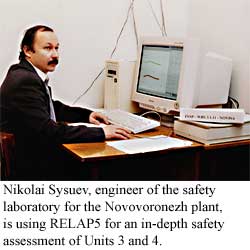
|
September 1999
Highlight |
Armenia Bulgaria Czech Republic Hungary |
Kazakhstan Lithuania Russia Slovakia |
Ukraine United States Cross-Cutting Activities Planned Activities |
Russia

Infrared Thermography Training Provided at Leningrad Nuclear Power Plant
In early September, Pacific Northwest National Laboratory (PNNL) specialists conducted training on the use of the infrared camera and infrared technology at the Leningrad nuclear power plant (NPP) training facility. The goal of the training was to ensure that plant staff could carry out infrared surveys on their own. Eight plant staff from several maintenance repair departments attended the training. A quick overview of the camera and its operation as well as infrared technology fundamentals was provided. The infrared fundamentals training provided the attendees an adequate knowledge base to understand camera operation and correctly analyze the infrared images. Additional hands-on training was conducted in the high-voltage switchyard, where all class attendees practiced camera and survey skills. Then the class took the images captured back to the classroom setting and reviewed and critiqued them. In addition, the U.S. specialists provided training on the use and operation of the infrared analytical software. (Grigory Trosman, DOE, 301-903-3581; Thomas Vehec, PNNL, 509-372-4072)![]()
Workshop Held on Upgrading Control-and-Protection System Modules for Russian Nuclear Power Plants
A U.S. representative from PNNL met with representatives from the Russian Research Institute for Nuclear Power Plant Operations (VNIIAES), U.S. Department of Energy (DOE), and Oak Ridge National Laboratory (ORNL) to discuss planned activities for the Reactor Module Safety Improvement Project. The Russian participants have developed a pilot project that can serve as a model for digital control-and-protection system upgrades at Russian Nuclear Power Plants. The plan involves developing infrastructure within Russia for the design and manufacture of digital systems, providing a simulator-based platform for testing control-and-protection system upgrades, and producing a prototype control system upgrade for Kursk NPP. During the workshop, a presentation on U.S. experience and favorable practices with digital control system upgrades was given, and the Russian participants presented the project concept and system specifications as currently developed. VNIIAES management submitted proposals for project tasks that are complementary to activities eligible for U.S. funding. Management representatives of the International Science and Technology Center (ISTC) will review the proposals; proposal approval is expected no later than February 2000. Progress will depend on available funding. (Norman Fletcher, DOE, 301-903-3275; Rich Denning, PNNL, 614-424-7412)![]()
U.S. Team Supporting In-Depth Safety Assessment at Novovoronezh
Representatives of the Kurchatov Institute, Atomenergoproekt, and Novovoronezh NPP met with specialists from Argonne National Laboratory (ANL) and Science Applications International Corporaton (SAIC) in support of the Novovoronezh in-depth safety analysis project. The meetings occurred September 21-23. The highest priorities at the Novovoronezh plant are probabilistic risk assessment (PRA) and design-basis accident analysis at Units 3 and 4. These studies are expected to be complete in mid-2000. A format and content guide for preparing an in-depth safety assessment report was prepared by SAIC, and a production plan was scheduled for preparation in October. The Unit 3 report is scheduled for completion by the end of 2000. The Unit 4 report will be completed in 2001. The Unit 3 report will serve as a model for additional in-depth safety assessment reports at Novovoronezh and Kola NPPs. Novovoronezh staff requested U.S. support during the in-depth safety assessment process and subsequent regulatory review. (Walter Pasedag, DOE, 301-903-3628; Sam McKay, PNNL, 509-372-4059)![]()
Steering Committee Established for Safety Efforts at Kola
A safety improvement steering committee consisting of representatives from Sweden (SIP), Norway (NRPA), Finland (STUK), DOE, and Kola NPP was established during a September meeting in Stockholm. The committee will address all aspects of safety-related assistance to Kola NPP. Meetings will be held twice a year. At the Stockholm meeting, Kola NPP staff distributed the summary report for the Unit 4 PRA. A peer review of the PRA, organized by SIP, will be completed in April 2000. DOE is providing part of the PRA funding. Other safety work discussed included SIP assistance in developing emergency operating instructions (EOIs), ongoing fire hazards analysis at Unit 4, and proposed assistance in nondestructive testing. (Walter Pasedag, DOE, 301-903-3628; Sam McKay, PNNL, 509-372-4059)![]()
Kola Nuclear Power Plant Gets Passing Grades After Y2K Evaluation
A PNNL representative participated in the Rosenergoatom (REA) review meetings for the ongoing year-2000 (Y2K) evaluation program at Kola NPP. The REA team and the plant representatives appeared well prepared for the review of the plant's work. During an initial meeting, the REA team familiarized the plant staff with their expectations and agenda, and the plant staff provided a general overview of their activities to date. Additional meetings were devoted to detailed reviews of the plant's efforts and documentation, demonstrations of testing processes, and review of the existing Y2K problems. The plant staff provided complete access to their documentation, experts, and systems. The plant staff had made a satisfactory effort in applying the Minatom Y2K review methodology, which is based on the International Atomic Energy Agency's (IAEA's) Y2K guidance. The plant staff has completed its inventory and assessment phases, nearly completed its remediation phase, and begun its contingency planning. Overall, the plant's implementation of the Minatom Y2K methodology and REA's review appears adequate to ensure the plant's Y2K vulnerabilities are known and either remediated or accounted for in contingency planning. (Norman Fletcher, DOE, 301-903-3275; Tye Blackburn, PNNL, 509-372-4092)![]()
Steps Taken Toward Purchase of Y2K-Compliant Computers for Russian Plants
U.S. specialists from PNNL traveled to Moscow in September to arrange purchases of computer equipment to help resolve Y2K issues at nuclear power plants in Russia. They obtained adequate information from Leningrad NPP to begin implementing the purchase. U.S. specialists gathered information for Kola NPP during a review of that plant's Y2K efforts. A PNNL contract specialist conducted meetings with vendors to locate sources of equipment. Plans are to implement purchases of computers and software at the other plants during October and November. (Norman Fletcher, DOE, 301-903-3275; Tye Blackburn, PNNL, 509-372-4092)![]()
